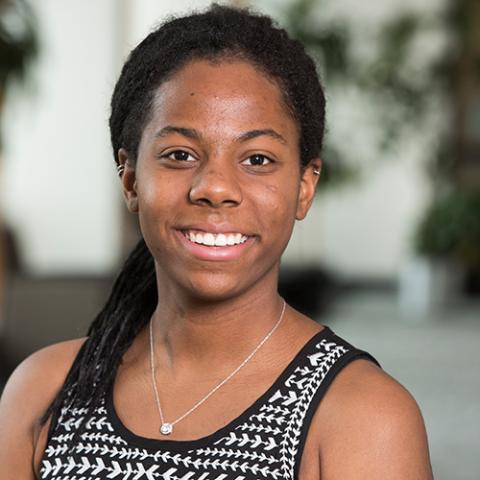McNair Scholar 2017 - Kamilah Amen
Kamilah Amen is a junior at the University of Minnesota-Twin Cities, majoring in Chemistry and minoring in Bioproducts Engineering. Her research interests include cell/tissue mechanics, chemical synthesis, and environmental and renewable energy sciences. She plans on continuing her education into graduate school and pursuing her Ph.D in Chemistry.
Quote from Kamilah Amen

My dream is to continuously learn and be curious. I want to gain the knowledge and the skills to search and solve the unanswered questions regarding the chemistry involved with life
Research project
Alteration of Oligodendrocyte Functional Mechanics by Neurodegenetive Disease
Abstract: Neurodegenerative diseases affect one billion people worldwide. Neurodegenerative diseases alter the function and properties of the cells that they affect. Neurons in the central nervous system are supported by surrounding glial cells. There are three primary types of glial cells: oligodendrocytes, microglia, and astrocytes. Oligodendrocytes form the myelin sheaths that wrap around the neuronal axons, protecting cell connections and enhancing the action potentials. Thus, it is important to understand how oligodendrocytes are affected in neurodegenerative diseases. Here, we used traction force microscopy and immunofluorescent staining to explore how disease related extracellular factors alter cellular force generation and morphology. We find that amyloid- and -synuclein, associated with Alzheimer’s disease and Parkinson’s disease, respectively, can affect cellular traction and process formation. These results suggest that alteration of glial mechanical function could play a role in the progression of neurodegenerative diseases.
Faculty mentor
Dr. Patrick Alford is an Assistant Professor in the department of Biomedical Engineering in the College of Science and Engineering at the University of Minnesota. Dr. Alford received his Ph.D in Biomedical Engineering from Washington University in St. Louis and was a Postdoctoral Fellow at Harvard University. His current work focuses on the biomechanics and mechanotransduction of vascular tissue and vascular smooth muscle cells, as well as traumatic brain injury. His research is supported by the National Science Foundation, National Institutes of Health, and the American Heart Association. This year is Dr. Alford’s first year as a McNair faculty mentor.